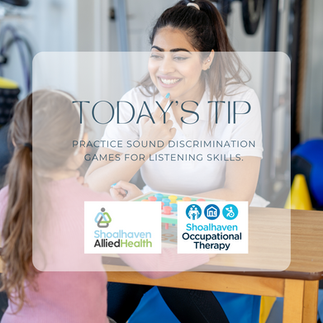7 Practical Speech Pathology Tips to Improve Communication Skills at Any Age
- claire2876
- Apr 8
- 3 min read
Updated: 4 days ago
At Shoalhaven Allied Health, our speech pathology team is passionate about helping clients of all ages build stronger communication skills. Whether you're a parent supporting a child's language development or an adult working through communication changes, there are small, practical things you can do every day to help.
We believe communication is more than just speaking—it's about connection, confidence, and being understood. That’s why we’ve put together seven evidence-informed tips that can support communication growth at home, school, work, or in the community.
1. Model, Don’t Correct
If your child makes an error when speaking, try repeating back what they said using the correct words or grammar—without pointing out the mistake. For example, if your child says, “He go to park,” you can respond with, “Yes, he went to the park!” This is called modelling, and it helps reinforce correct language in a positive, encouraging way.
2. Give Time to Respond
Many people—especially those with processing difficulties, autism, or after stroke—need more time to think before responding. Try counting silently to five after asking a question. Avoid jumping in to fill the silence; giving space shows that you value their response.
3. Use Visual Supports
For kids and adults alike, visual cues such as pictures, key words, or gestures can reduce the communication load. Try using a visual schedule, communication board, or even just drawing quick pictures during conversations. This can be a game-changer, especially for individuals with limited verbal skills or memory challenges.
4. Read Aloud Together
Reading isn’t just about literacy—it’s also a powerful way to build vocabulary, sentence structure, and storytelling skills. For young children, reading aloud every day—even for five minutes—makes a big difference. For adults with communication difficulties, reading simple news articles or short stories together can help rebuild confidence and spark conversation.
5. Encourage Turn-Taking in Conversation
Communication is a two-way street. Practice taking turns during play or conversation, and praise your child (or communication partner) when they wait their turn, ask a question, or respond appropriately. Games like board games, card games, or pretend play are great ways to build this skill naturally.
6. Celebrate All Forms of Communication
Not all communication looks the same. Whether someone uses gestures, signs, a communication device, or just a few words—they’re still communicating! Celebrate every attempt, and remember that building confidence is just as important as building vocabulary.
7. Make it Fun and Relevant
The best way to improve communication skills? Make it meaningful! Talk about your child’s interests—whether it’s dinosaurs, dance, or dogs. For adults, focus on functional communication like ordering coffee, calling a friend, or sharing memories. The more relevant and enjoyable the interaction, the more likely it will stick.
We're Here to Help
At Shoalhaven Allied Health, we understand that every communicator is different—and our team is trained to tailor strategies to suit individual goals and abilities.
While many families believe there’s a two-year waitlist to see a speech pathologist, that’s no longer the case with us. Thanks to our growing team, we now have appointments available for both adult and paediatric clients within the next 1–2 months.
Whether you’re concerned about your child’s speech, looking for support post-stroke, or just want to build more confidence with communication, our speech pathology team is here to support you.
📞 Contact our friendly team today to chat about how we can help—or to make a referral: Make a Referral














